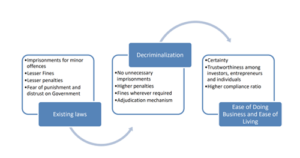What is the Jan Vishwas Bill, 2023 proposed by Centre?
Relevance:
Quick Facts For Prelims,
GS Paper – 2, Government Policies & Interventions
Context:
News: The Jan Vishwas (Amendment of Provisions) Bill, 2023 was passed in Parliament recently.
Objective of the Bill:
- To redefine the regulatory landscape of the country with decriminalization of minor offences under 42 Acts.
- To reduce compliance burden and promote ease of living and doing business in the country.
More about the Bill:
- The Bill was tabled in Parliament by the Union Ministry of Commerce and Industry (December 2022) and then referred to a Joint Parliamentary Committee.
- As per reports, most recommendations of the JPC have been approved by the Union Cabinet, clearing the way for its passing.
About Jan Vishwas Bill:
- Introduced by Commerce and Industry Minister Piyush Goyal, the Bill aims at giving further boost to ease of living and ease of doing business.
- The Jan Vishwas (Amendment of Provisions) Bill, 2022 amends 42 laws, across multiple sectors, including agriculture, environment, and media and publication and health.
- The Bill converts several fines to penalties, meaning that court prosecution is not necessary to administer punishments. It also removes imprisonment as a punishment for many offences.
- Covered under the Jan Vishwas (Amendment of Provisions) Bill, 2023 are changes in the Drugs and Cosmetics Act, 1940, the Food Safety and Standards Act, 2006 and the Pharmacy Act, 1948.
- This has evoked heated debate about its pros and cons among health care activists, experts in the field of pharmacy and patient-welfare groups.
- Among these, the changes proposed to the Drugs and Cosmetics Act, 1940 have been the most contentious.
- The Act regulates the import, manufacture, distribution and sale of drugs and cosmetics in the country.
- Currently, the Act defines four categories of offences— adulterated drugs, spurious drugs, mislabelled drugs, and Not of Standard Quality drugs (NSQs) — and lays out degrees of punishment (a combination of prison time and fine) based on the degree of offence.
Salient provisions of the Bill:
- Decriminalizing: 180 offences across 42 laws governing environment, agriculture, media, industry and trade, etc.
- Completely remove/ replace imprisonment clauses: With monetary fines.
- Compounding of offences in some provisions.
- Removes all offences and penalties under the Indian Post Office Act, 1898.
- Changes in grievance redressal mechanisms: Appointment of one or more Adjudicating Officers for determining penalties.
- A periodic revision of fines and penalties: An increase of 10% of the minimum amount every 3 years for various offences in the specified Acts.
Some key laws covered in the Bill:
- The Air (Prevention and Control of Pollution) Act, 1981
- The Environment (Protection) Act, 1986
- The Indian Forest Act, 1927
- The Agricultural Produce (Grading & Marking) Act, 1937
- The Information Technology Act, 2000
- The Copyright Act, 1957
- The Motor Vehicles Act, 1988
- The Cinematograph Act, 1952
- The Food Safety and Standards Act, 2006, etc
Need for the Bill:
A large number of compliances govern doing business in India:
- Currently, there are 1,536 laws which translate into around 70,000 compliances that govern doing business in India.
- Among these, 26,134 have imprisonment clauses as a penalty for non-compliance.
- Lengthy processing times for the needed approvals: Escalating costs and dampening the entrepreneurial spirit.
Implications:
- Excessive compliances have proved burdensome for business enterprises, especially MSMEs.
- Creating barriers to the smooth flow of ideas and the creation of jobs, wealth and GDP.
Significance of the Bill:
- Reducing the compliance burden gives impetus to the business ecosystem and improves the well-being of the public.
- Smoother processes will attract more investment.
- It will reduce judicial burden, as settlement by compounding method, adjudication and administrative mechanism will save time, energy and resources.
- In short, the Bill seeks to bolster ‘trust-based governance’ – promoting ease of doing business and ease of living.
Concerns:
- Quasi-decriminalization: The monetary fines or penalties are not a good enough attempt at decriminalization.
- Remove the deterrence effect of the environmental legislation: The blanket removal of imprisonment provision might remove deterrence, especially for large corporations profiteering from the offence.
- Adjudicating Officers may lack the technical competence: Necessary to decide all penalties under the Air (Prevention and Control of Pollution) Act 1981 and the Environment (Protection) Act 1986.
- Many offences: (like theft or misappropriation of postal articles) proposed to be removed have nothing to do with its objective of decriminalization to promote ease of doing business.
Way forward:
- The laws shouldn’t become a cost-to-operation component for companies but should install in them the greater sensibilities and responsibilities towards the society.
- India is the pharmacy of the world and we have to work towards ensuring that the best medicines are provided while reasonable benefits are offered to business.
- Rationalizing laws, eliminating barriers and bolstering growth of businesses are important.




